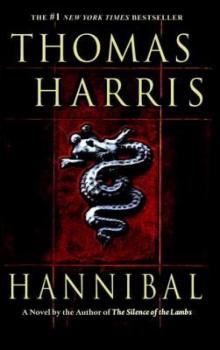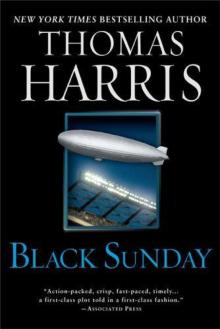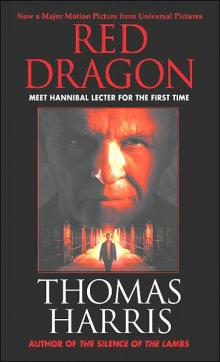- Home
- Thomas Harris
Hannibal Rising Page 12
Hannibal Rising Read online
Page 12
Hannibal had finished with the chest dissection when the electricity failed, as it often did, and the lights went out. He worked at the sink by the light of a kerosene lamp, flushing away the blood and straw from his subject’s face and waiting for the electricity to come on again.
When the lights came up, he wasted no time reflecting the scalp and removing the top of the cranium in a coronal dissection to expose the brain. He injected the major blood vessels with colored gel, piercing the dura mater covering the brain as little as possible. It was more difficult, but the professor, inclined to the theatrical, would want to remove the dura mater himself before the class, whipping the curtain off the brain, so Hannibal left it largely intact.
He rested his gloved hand lightly on the brain. Obsessed with memory, and the blank places in his own mind, he wished that by touch he could read a dead man’s dreams, that by force of will he could explore his own.
The laboratory at night was a good place to think, the quiet broken only by the clink of instruments and, rarely, the groan of a subject in an early stage of dissection, when organs might still contain some air.
Hannibal performed a meticulous partial dissection of the left side of the face, then sketched the head, both the dissected side of the face and the untouched side as well, for the anatomical illustrations that were part of his scholarship.
Now he wanted to permanently store in his mind the muscular, neural and venous structures of the face. Sitting with his gloved hand on the head of his subject, Hannibal went to the center of his own mind and into the foyer of his memory palace. He elected for music in the corridors, a Bach string quartet, and passed quickly through the Hall of Mathematics, through Chemistry, to a room he’d adopted recently from the Carnavalet Museum and renamed the Hall of the Cranium. It took only a few minutes to store everything, associating anatomical details with the set arrangement of displays in the Carnavalet, being careful not to put the venous blues of the face against blues in the tapestries.
When he had finished in the Hall of the Cranium, he paused for a moment in the Hall of Mathematics, near the entrance. It was one of the oldest parts of the palace in his mind. He wanted to treat himself to the feeling he got at the age of seven when he understood the proof Mr. Jakov showed him. All of Mr. Jakov’s tutorial sessions at the castle were stored there, but none of their talks from the hunting lodge.
Everything from the hunting lodge was outside the memory palace, still on the grounds, but in the dark sheds of his dreams, scorched black like the hunting lodge, and to get there he would have to go outside. He would have to cross the snow where the ripped pages of Huyghens’ Treatise on Light blew across Mr. Jakov’s brains and blood, scattered and frozen to the snow.
In these palace corridors he could choose music or not, but in the sheds he could not control the sound, and a particular sound there could kill him.
He emerged from the memory palace back into his mind, came back behind his eyes and to his eighteen-year-old body, which sat beside the table in the anatomy laboratory, his hand upon a brain.
He sketched for another hour. In his finished sketch, the veins and nerves of the dissected half of the face exactly reflected the subject on the table. The unmarked side of the face did not resemble the subject at all. It was a face from the sheds. It was the face of Vladis Grutas, though Hannibal only thought of him as Blue-Eyes.
Up the five flights of narrow stairs to his room above the medical school, and sleep.
The garret’s ceiling sloped, and the low side was neat, harmonious, Japanese, with a low bed. His desk was on the high side of the room. The walls around and over his desk were wild with images, drawings of dissections, anatomical illustrations in progress. In each case the organs and vessels were exactly rendered, but the faces of the subjects were faces he saw in dreams. Over all, a long-fanged gibbon skull watched from a shelf.
He could scrub away the smell of formalin, and the chemical smell of the lab did not reach this high in the drafty old building. He did not carry grotesque images of the dead and half-dissected into his sleep, nor the criminals, cleaved or hanged, he sometimes picked up from the jails. There was only one image, one sound, that could drive him out of sleep. And he never knew when it was coming.
Moonset. The moonlight diffused by the wavy, bubbled window glass creeps across Hannibal’s face and inches silent up the wall. It touches Mischa’s hand in the drawing above his bed, moves over the partial faces in the anatomical drawings, moves over the faces from his dreams, and comes at last to the gibbon skull, first shining white on the great fangs and then the brow above the deep eye sockets. From the dark inside its skull, the gibbon watches Hannibal asleep. Hannibal’s face is childlike. He makes a noise and turns on his side, pulling his arm away from an unseen grip.
Standing with Mischa in the barn beside the lodge, holding her close, Mischa coughing. Bowl-Man feels the flesh of their arms and speaks, but no sound comes out of his mouth, only his vile breath visible in the freezing air. Mischa buries her face against Hannibal’s chest to get away from Bowl-Man’s breath. Blue-Eyes is saying something, and now they are singing, cozening. Seeing the axe and bowl. Flying at Blue-Eyes, taste of blood and beard stubble, they are taking Mischa away. They have the axe and the bowl. Breaking free and running after them, feet lifting tooo sloooow to the door, Blue-Eyed One and Bowl-Man holding Mischa by her wrists above the ground, she twisting her head to look back desperately at him across the bloody snow and calling—
Hannibal came awake, choking, holding on to the end of the dream, clamping his eyes tight shut and tried to force himself past the point where he awoke. He bit the corner of the pillowcase and made himself go over the dream. What did the men call each other? What were their names? When did he lose the sound? He couldn’t remember when it went away. He wanted to know what they called each other. He had to finish the dream. He went into his memory palace and tried to cross the grounds to the dark sheds, past Mr. Jakov’s brains on the snow, but he could not. He could endure to see his mother’s clothes on fire, his parents and Berndt and Mr. Jakov dead in the yard. He could see the looters moving below him and Mischa in the hunting lodge. But he could not go past Mischa suspended in the air, turning her head to look at him. He could remember nothing after that, he could only recall much later, he was riding on a tank, found by the soldiers with the chain locked around his neck. He wanted to remember. He had to remember. Teeth-inastoolpit. The flash did not come often; it made him sit up. He looked at the gibbon in the moonlight. Teeth much smaller than that. Baby teeth. Not terrible. Like mine can be. I have to hear the voices carried on their stinking breath, I know what their words smell like. I have to remember their names. I have to find them. And I will. How can I interrogate myself?
36
PROFESSOR DUMAS WROTE a mild, round hand, unnatural in a physician. His note said: Hannibal, would you please see what you can do in the matter of Louis Ferrat at La Santé?
The professor had attached a newspaper clipping about Ferrat’s sentencing with a few details about him: Ferrat, from Lyon, had been a minor Vichy functionary, a petty collaborator during the German occupation, but then was arrested by the Germans for forging and selling ration coupons. After the war he was accused of complicity in war crimes, but released for insufficient evidence. A French court convicted him of killing two women in 1949-1950 for personal reasons. He was scheduled to die in three days.
La Santé Prison is in the 14th arrondissement, not far from the medical school. Hannibal reached it in a fifteen-minute walk.
Workmen with a load of pipe were repairing the drains in the courtyard, the site of guillotine executions since the public was barred from attending in 1939. The guards at the gate knew Hannibal by sight and passed him in. As he signed the visitors’ log he saw the signature of Inspector Popil high on the page.
The sound of hammering came from a large bare room off the main corridor. As he passed by Hannibal caught sight of a face he recognized. The state executioner,
Anatole Tourneau himself, traditionally known as “Monsieur de Paris,” had brought the guillotine from its garage on the Rue de la Tombe-Issoire to set it up inside the prison. He was twiddling the little wheels of the blade carrier, the mouton, which prevent the blade from jamming on its way down.
Monsieur de Paris was a perfectionist. To his credit, he always used a cover at the top of the uprights so the subject did not have to see the blade.
Louis Ferrat was in the condemned cell, separated by a corridor from the other cells on a second-floor tier in the first building of La Santé. The din of the crowded prison reached his cell as a wash of murmurings and cries and clangs, but he could hear the blows of Monsieur Paris’ mallet as the assembly proceeded on the floor below.
Louis Ferrat was a slender man, with dark hair, newly cropped off his neck and the back of his head.The hair on top was left long, to provide Monsieur Paris’ assistant a better grip than Louis’ small ears would provide.
Ferrat sat on his cot in combination underwear, rubbing between his thumb and fingers a cross on a chain about his neck. His shirt and pants were carefully arranged on a chair, as though a person had been seated there and evaporated out of the clothing. The shoes were side by side beneath the pants cuffs. The clothing reclined in the chair in the anatomical position. Ferrat heard Hannibal but he did not look up.
“Monsieur Louis Ferrat, good afternoon,” Hannibal said.
“Monsieur Ferrat has stepped away from his cell,” Ferrat said. “I represent him. What do you want?”
Hannibal took in the clothing without moving his eyes. “I want to ask him to make a gift of his body to the medical school, for science. It will be treated with great respect.”
“You’ll take his body anyway. Drag it away.”
“I can’t and I wouldn’t take his body without his permission. Or ever drag it.”
“Ah, here is my client now,” Ferrat said. He turned away from Hannibal and conferred quietly with the clothing as though it had just walked into the cell and seated itself in the chair. Ferrat returned to the bars.
“He wants to know why should he give it to you?”
“Fifteen thousand francs for his relatives.”
Ferrat turned to the clothing and then back to Hannibal. “Monsieur Ferrat says, Fuck my relatives. They hold out their hand and I’ll shit in it.” Ferrat dropped his voice. “Forgive the language—he is distraught, and the gravity of the matter requires me to quote him exactly.”
“I understand perfectly,” Hannibal said. “Do you think he’d like to contribute the fee to a cause his family despises, would that be a satisfaction to him, Monsieur …?”
“You may call me Louis—Monsieur Ferrat and I share the same first name. No. I believe he is adamant. Monsieur Ferrat lives somewhat apart from himself. He says he has very little influence on himself.”
“I see. He is not alone in that.”
“I hardly see how you understand anything, you’re not much more than a chi—not much more than a schoolboy yourself.”
“You might help me then. Each student at the medical school writes a personal letter of appreciation to the donor with whom he is involved. Knowing Monsieur Ferrat as you do, could you help me compose a letter of appreciation? Just in case he should decide favorably?”
Ferrat rubbed his face. His fingers appeared to have an extra set of knuckles where they had been broken and badly set years ago.
“Who would ever read it, other than Monsieur Ferrat himself?”
“It would be posted at the school, if he wishes. All the faculty would see it, prominent and influential people. He could submit it to Le Canard Enchaîné for publication.”
“What sort of thing would you want to say?”
“I’d describe him as selfless, cite his contribution to science, to the French people, to medical advances that will help the oncoming generation of children.”
“Never mind children. Leave children out.”
Hannibal quickly wrote a salutation on his notepad. “Do you think this is sufficiently honorific?” He held it up high enough for Louis Ferrat to have to look up at it, the better to gauge the length of his neck.
Not a very long neck. Unless Monsieur Paris got a good grip on his hair, there wouldn’t be much left below the hyoid bone, useless for a frontal cervical triangle display.
“We mustn’t neglect his patriotism,” Ferrat said. “When Le Grand Charles broadcast from London, who responded? It was Ferrat at the barricades! Vive la France!”
Hannibal watched as patriotic fervor swelled the artery in the traitor Ferrat’s forehead and caused the jugular and carotid to stand out in his neck—an eminently injectable head.
“Yes, vive la France!” Hannibal said, redoubling his efforts: “Our letter should emphasize that, though they call him Vichy, he was actually a hero of the Resistance, then?”
“Certainly.”
“He saved downed airmen, I would imagine?”
“On a number of occasions.”
“Performed the customary acts of sabotage?”
“Often, and without regard for his own safety.”
“Tried to protect the Jews?”
Quarter-second hitch. “Heedless of risk to himself.”
“Was tortured perhaps, he suffered broken fingers for the sake of France?”
“He could still use them to salute proudly when Le Grand Charles returned,” Ferrat said.
Hannibal finished scribbling. “I’ve just listed the highlights here, do you think you could show it to him?”
Ferrat looked over the sheet of notebook paper, touching each point with his forefinger, nodding, murmuring to himself. “You might put in a few testimonials from his friends in the Resistance, I could supply those. A moment please.” Ferrat turned his back to Hannibal and leaned close to his clothing. He turned back with a decision.
“My client’s response is: Merde. Tell the young fucker I’ll see the dope and rub it on my gums first before I sign. Pardon, but that is verbatim literatim.” Ferrat became confidential, leaning close to the bars. “Others on the tier told him he could get enough laudanum—enough laudanum to be indifferent to the knife. ‘To dream and not to scream’ is how I’d couch it in a courtroom setting. The St. Pierre medical school is giving laudanum in exchange for … permission. Do you give laudanum?”
“I will be back to see you, with an answer for him.”
“I wouldn’t wait too long,” Ferrat said. “St. Pierre will be coming round.” He raised his voice and gripped the neck of his combination underwear as he might clutch his waistcoat during an oration. “I’m empowered to negotiate on his behalf with St. Pierre as well.” Close to the bars and quiet now: “Three days and poor Ferrat will be dead, and I’ll be in mourning and out a client. You are a medical person. Do you think it’s going to hurt? Hurt Monsieur Ferrat when they …”
“Absolutely not. The uncomfortable part is now. Beforehand. As for the thing itself, no. Not even for an instant.” Hannibal had started away when Ferrat called to him and he went back to the bars.
“The students wouldn’t laugh at him, at his parts.”
“Certainly not. A subject is always draped, except for the exact field of study.”
“Even if he were … somewhat unique?”
“In what way?”
“Even if he had, well, infantile parts?”
“A common circumstance, and never, ever, an occasion for humor,” Hannibal said. There’s a candidate for the anatomy museum, where donors are not credited.
The pounding of the executioner’s mallet registered as a twitch in the corner of Louis Ferrat’s eye as he sat on his bunk, his hand on the sleeve of his companion, the clothes. Hannibal saw him imagining the assembly in his mind, the uprights lifted into place, the blade with its edge protected by a slit piece of garden hose, beneath it the receptacle.
With a start, seeing it in his mind, Hannibal realized what the receptacle was. It was a baby’s bathtub. Like a falling blade Hannibal’
s mind cut off the thought and, in the silence after, Louis’ anguish was as familiar to him as the veins in the man’s face, as the arteries in his own.
“I’ll get him the laudanum,” Hannibal said. Failing laudanum, he could buy a ball of opium in a doorway.
“Give me the consent form. Collect it when you bring the dope.”
Hannibal looked at Louis Ferrat, reading his face as intently as he had studied his neck, smelling the fear on him, and said, “Louis, something for your client to consider. All the wars, all the suffering and pain that happened in the centuries before his birth, before his life, how much did all that bother him?”
“Not at all.”
“Then why should anything after his life bother him? It is untroubled sleep. The difference is he will not wake to this.”
37
THE ORIGINAL WOOD BLOCK engravings for Vesalius’ great atlas of anatomy, De Fabrica, were destroyed in Munich in World War II. For Dr. Dumas the engravings were holy relics and in his grief and anger he became inspired to compile a new atlas of anatomy. It would be the best to date in the line of atlases that succeeded Vesalius’ in the four hundred years since De Fabrica.
Dumas found that drawings were superior to photography in illustrating the anatomy and essential in elucidating cloudy X-rays. Dr. Dumas was a superior anatomist, but he was not an artist. To his great good fortune, he saw Hannibal Lecter’s schoolboy drawing of a frog, followed his progress and secured for him a medical scholarship.
Early evening in the laboratory. During the day Professor Dumas had dissected the inner ear in his daily lecture, and left it to Hannibal, who now drew the cochlear bones on chalkboard at 5x enlargement.
The night bell rang. Hannibal was expecting a delivery from the Fresnes firing squad. He collected a gurney and pushed it down the long corridor to the night entrance. One wheel of the gurney clicked on the stone floor and he made a mental note to fix it.

 The Silence of the Lambs
The Silence of the Lambs Red Dragon
Red Dragon Hannibal
Hannibal Black Sunday
Black Sunday Cari Mora
Cari Mora Hannibal Rising
Hannibal Rising Red Dragon hl-1
Red Dragon hl-1 The Silence of the Lambs (Hannibal Lecter)
The Silence of the Lambs (Hannibal Lecter)